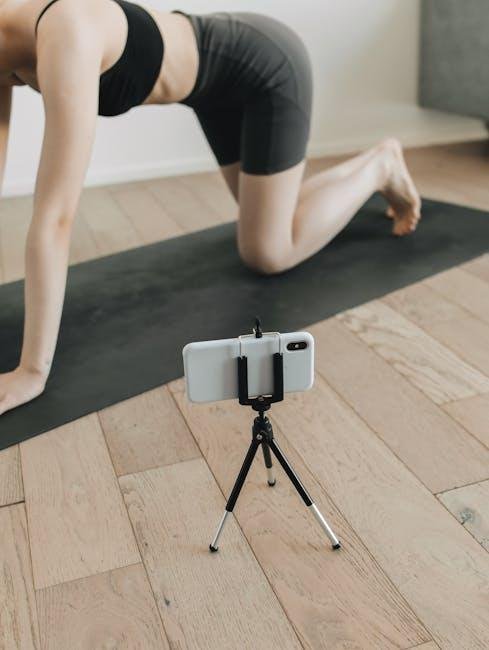In a world where the pace of life accelerates relentlessly, the pursuit of wellness has become both a necessity and a challenge. Amid the sea of digital promises, countless apps vie for attention, each claiming to be the key to a healthier, happier you. But beyond the buzzwords and flashy interfaces, which wellness apps truly deliver on their promises? This article explores a curated selection of wellness apps that stand out—not for their hype, but for their genuine ability to support mental, physical, and emotional well-being in practical, meaningful ways. Whether you’re seeking mindfulness, better sleep, or fitness motivation, these tools offer more than just convenience—they offer real help.
Table of Contents
- Wellness Apps That Offer Personalized Mindfulness Practices
- Nutrition Tracking Apps Backed by Scientific Research
- Fitness Apps That Adapt to Your Unique Goals and Abilities
- Mental Health Support Tools With Proven Effectiveness
- Sleep Improvement Apps Using Data-Driven Techniques
- Holistic Wellness Platforms Combining Multiple Health Aspects
- Q&A
- Final Thoughts

Wellness Apps That Offer Personalized Mindfulness Practices
Today’s wellness apps go beyond generic meditation timers by integrating personalized mindfulness practices tailored to your unique lifestyle and emotional needs. These apps use advanced algorithms to analyze your mood, stress levels, and even your daily schedule, crafting a mindfulness routine that adapts in real-time. For example, if you’re feeling overwhelmed during a busy workday, some apps will suggest a quick breathing exercise, while others might guide you through a calming visualization before bedtime.
Here’s what sets these apps apart:
- Dynamic session lengths that fit into any part of your day
- Customizable themes such as anxiety relief, focus enhancement, or sleep improvement
- Progress tracking with insightful feedback to help you stay motivated
- Integration with wearable devices to measure physiological responses and fine-tune recommendations
| App | Personalization Feature | Best For |
|---|---|---|
| MindFlow | Mood-based session tailoring | Stress management |
| CalmSense | AI-driven guided meditations | Sleep improvement |
| BreatheWell | Real-time heart rate feedback | Focus and relaxation |
Nutrition Tracking Apps Backed by Scientific Research
When it comes to monitoring your dietary habits, apps grounded in rigorous scientific research provide an edge that mere calorie counters lack. These tools leverage validated nutritional databases and integrate evidence-based guidelines to deliver precise, personalized insights. Not only can they track your macro- and micronutrient intake, but they also analyze patterns over time, helping you identify areas for improvement with a level of sophistication that supports real, lasting change.
Top Features to Look For:
- Validated Food Composition Data: Ensures accuracy in nutrient calculations.
- Personalized Recommendations: Tailors guidance based on user-specific goals and health conditions.
- Integration with Wearables: Syncs activity and biometrics for holistic wellness tracking.
- Behavioral Insights: Uses psychology-based nudges to encourage healthier choices.
| App | Research Validation | Unique Selling Point |
|---|---|---|
| NutriSense | Validated clinical trials | Continuous glucose monitoring feedback |
| MyFitnessPro | Collaborations with dietitians | Detailed micronutrient tracking |
| FoodTrackRx | Published peer-reviewed studies | AI-driven meal suggestions |
Fitness Apps That Adapt to Your Unique Goals and Abilities
Today’s fitness apps are no longer one-size-fits-all; they evolve intelligently alongside your progress and setbacks. By leveraging machine learning and biometric data, these platforms offer personalized workout plans that respect your current fitness level, injury history, and time constraints. Whether you’re a beginner looking to build endurance or an experienced athlete aiming to enhance muscle definition, these dynamic tools adjust intensity and exercise variety in real time, ensuring steady progress without burnout.
Beyond just workouts, many apps incorporate lifestyle factors such as sleep patterns, nutrition habits, and stress levels, creating a holistic approach to health. Features often include:
- Adaptive coaching: evolving instructions based on performance feedback
- Goal recalibration: flexible objectives that shift as you improve or face challenges
- Custom recovery plans: suggested rest and mobility exercises tailored to your body’s responses
| App | Key Adaptation Feature | Ideal User |
|---|---|---|
| FitFlex | Real-time intensity tuning | Beginners & intermediates |
| StriveSmart | AI-driven recovery suggestions | Injury-prone athletes |
| PulsePerfect | Personalized heart rate zones | Endurance trainers |
Mental Health Support Tools With Proven Effectiveness
In today’s digital landscape, finding mental health support that delivers tangible results is more accessible than ever. Tools like guided meditation apps and cognitive-behavioral therapy (CBT) platforms have evolved with research-backed techniques to lower stress, reduce anxiety, and build resilience. These apps often combine mood tracking, real-time therapy sessions, and personalized coping strategies, ensuring that users benefit from a tailored experience rather than a one-size-fits-all approach. Popular choices use evidence-based methodologies to foster mindfulness and emotional well-being, empowering users to regain control over their mental health with consistent use.
Below is a quick comparison of some leading mental health apps, highlighting their core strengths and features, helping you choose the best fit for your wellness journey:
| App | Key Feature | Proven Benefits | Subscription |
|---|---|---|---|
| Calm | Guided meditation & sleep stories | Improved sleep quality & reduced anxiety | Free + Premium |
| Woebot | Chatbot CBT support | Increased emotional awareness & coping skills | Free |
| Headspace | Mindfulness & stress management | Reduced stress & enhanced focus | Paid subscription |
| Talkspace | Online therapy sessions | Personalized therapy & symptom reduction | Monthly subscription |
Sleep Improvement Apps Using Data-Driven Techniques
Modern sleep improvement tools harness the power of data analytics and machine learning to tailor recommendations that align perfectly with individual sleep patterns. These apps go beyond simple timers and alarms; they continuously gather information from wearable devices or smartphone sensors to map out your sleep stages, duration, and disruptions. By crunching this data, they offer insightful feedback such as optimal bedtime, relaxation techniques, and personalized environmental adjustments—transforming restless nights into rejuvenating rest.
Key features driving better sleep include:
- Real-time sleep monitoring with precision tracking
- AI-powered coaching based on your historical sleep trends
- Smart alarm systems that wake users during light sleep phases
- Customized soundscapes and breathing exercises tailored to reduce anxiety
| App Name | Unique Data-Driven Feature | User Benefit |
|---|---|---|
| SomniSense | AI Sleep Stage Prediction | Improved sleep efficiency |
| DreamSync | Adaptive Soundscapes | Deeper relaxation & quicker sleep onset |
| RestMetrics | Personalized Sleep Coaching | Long-term sleep habit refinement |
Holistic Wellness Platforms Combining Multiple Health Aspects
Modern wellness apps are evolving beyond single-focus tools to embrace a comprehensive, integrative approach that nurtures mind, body, and soul simultaneously. These platforms offer a seamless blend of features—mental health guidance, fitness tracking, nutrition planning, and sleep analysis—all synthesized into a personalized wellness ecosystem. Through intelligent algorithms and user-friendly design, they deliver tailored routines that adapt as your lifestyle changes, fostering sustainable habits rather than quick fixes.
Key benefits users gain from such multi-dimensional platforms include:
- Holistic tracking: Monitor your emotional well-being alongside physical activity and dietary choices.
- Integrated insights: Receive recommendations based on combined health metrics, not isolated data points.
- Community and support: Connect with like-minded users for motivation and shared growth.
| Feature | Benefit | Example |
|---|---|---|
| Mindfulness exercises | Reduce stress and improve focus | Guided meditation sessions |
| Fitness tracking | Enhance physical health and endurance | Step count and workout logs |
| Nutrition coaching | Promote balanced eating habits | Personalized meal plans |
| Sleep monitoring | Boost recovery and energy levels | Smart sleep cycle alerts |
Q&A
Q&A:
Q1: What makes a wellness app truly effective?
A1: An effective wellness app combines evidence-based techniques with user-friendly design. It should offer personalized guidance, track progress meaningfully, and encourage sustainable habits rather than quick fixes. Integration with your lifestyle and realistic goal setting are key markers of true effectiveness.
Q2: Are wellness apps only about meditation and mindfulness?
A2: Not at all. While mindfulness and meditation apps are popular, wellness apps span a broad spectrum—covering areas like sleep improvement, fitness coaching, mental health support, nutrition tracking, and even habit building. The best apps often blend multiple wellness facets to address holistic well-being.
Q3: How do I know if a wellness app is trustworthy?
A3: Trustworthiness comes from transparent development sources, expert involvement, positive user reviews, and adherence to privacy standards. Apps backed by clinical research or developed in collaboration with health professionals tend to offer more reliable and safe guidance.
Q4: Can wellness apps replace professional therapy or medical advice?
A4: Wellness apps are valuable supplements but should not replace professional therapy or medical treatment, especially for serious mental or physical health issues. They work best as supportive tools to reinforce healthy habits between professional sessions or as part of a broader wellness plan.
Q5: What features should I look for in a wellness app?
A5: Key features include personalized tracking, motivational reminders, educational content, interactive exercises, and community support options. Look for apps that adapt to your progress and preferences, provide clear metrics, and respect your data privacy.
Q6: How do wellness apps keep users motivated over time?
A6: Successful apps employ strategies like gamification, setting achievable milestones, positive reinforcement, and social engagement. By creating a sense of accountability and progress, they help transform healthy behaviors into consistent routines.
Q7: Can wellness apps improve mental health during stressful times?
A7: Yes, many wellness apps offer tools specifically designed to manage stress, anxiety, and mood fluctuations through breathing exercises, cognitive-behavioral techniques, journaling prompts, and guided relaxation. While they can offer immediate relief and coping strategies, they are best used alongside professional support when needed.
Q8: Are wellness apps suitable for all ages?
A8: Many wellness apps cater to a wide age range, but some are specifically designed for adults or teens. It’s important to select apps appropriate for your age group, especially for children and adolescents, to ensure the content is safe, relevant, and developmentally suitable.
Q9: How do wellness apps integrate with other health tools?
A9: Many wellness apps sync with wearable devices and health platforms like Apple Health or Google Fit. This integration allows seamless data collection on activity, sleep, heart rate, and more, providing a comprehensive picture of your health and tailoring recommendations accordingly.
Q10: What’s the first step to getting started with a wellness app?
A10: Begin with identifying a specific wellness goal—whether it’s improving sleep, reducing stress, or increasing activity. Then, explore apps with strong reputations in that area, download one that feels approachable, and commit to using it consistently for a few weeks. Patience and persistence are essential to cultivating lasting wellness habits.
Final Thoughts
In a world brimming with digital distractions, it’s refreshing to find wellness apps that genuinely support our journey toward better health and balance. These tools, when chosen thoughtfully, can become personal allies—offering guidance, motivation, and a touch of calm in our busy lives. While no app is a magic fix, integrating the right ones into your daily routine can pave the way for meaningful change. Ultimately, wellness is a deeply personal path, but with these helpful companions in hand, the steps forward may feel a little lighter, a little clearer, and a lot more hopeful.

